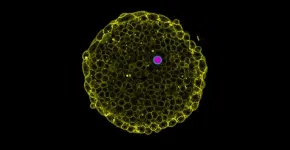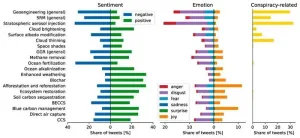(Press-News.org) In order to survive, organisms must control the pressure inside them, from the single-cell level to tissues and organs. Measuring these pressures in living cells and tissues in physiological conditions is a challenge.
In research that has its origin at UC Santa Barbara, scientists now at the Cluster of Excellence Physics of Life (PoL) at the Technical University in Dresden (TU Dresden), Germany, report in the journal Nature Communications a new technique to ‘visualize’ these pressures as organisms develop. These measurements can help understand how cells and tissues survive under pressure, and reveal how problems in regulating pressures lead to disease.
When molecules dissolved in water are separated into different compartments, water has the tendency to flow from one compartment to another to equilibrate their concentrations, a process known as osmosis. If some molecules cannot cross the membrane that separates them, a pressure imbalance — osmotic pressure — builds up between compartments. This principle is the basis for many technical applications, such as the desalination of seawater or the development of moisturizing creams. It turns out that maintaining a healthy functioning organism makes the list, too.
Our cells are constantly moving molecules in and out to prevent the pressure build-up from crushing them. To do so, they use molecular pumps that allow them to keep the pressure in check. This osmotic pressure affects many aspects of cells’ lives and even sets their size.
When cells team up to build our tissues and organs, they, too, face a pressure problem: Our vascular system, or organs such as the pancreas or liver, contain fluid-filled cavities known as lumens that are essential for their function. If cells fail to control osmotic pressure, these lumens may collapse or explode, with potentially catastrophic consequences for the organ. To understand how cells regulate pressure in these tissues, or how they fail to do so in disease, it is essential to measure and ‘see’ the osmotic pressure in live tissues. But unfortunately, this was not possible.
Until now.
Led by former UCSB professor Otger Campàs, who now holds the Chair of Tissue Dynamics at TU Dresden and is currently the managing director of PoL, the scientists devised a novel technique to measure the osmotic pressure in living cells and tissues by using special droplets known as double emulsions. For this pressure sensor, they introduced a water droplet into an oil droplet that permits water to flow through. When these “double-droplets” were exposed to salt solutions of different concentrations, water flowed in and out of the internal water droplet, changing its volume, until pressures were equilibrated. The researchers showed that the osmotic pressure can be measured by simply checking the droplet size. They then introduced these double-droplets into living cells and tissues using glass microcapillaries to reveal their osmotic pressure.
“It turns out that cells in animal tissues have the same osmotic pressure as plant cells but, unlike plants, they must balance it constantly with their environment to avoid exploding, since they do not have rigid cell walls,” Campàs said.
With this simple concept, this ingenious method now allows scientists to “see” osmotic pressure in a wide range of settings. “We know that several physical processes affect the working of our bodies,” Campàs said. “ In particular, osmotic pressure is known to play a fundamental role in the building of organs during embryogenesis, and also in the maintenance of healthy adult organs. With this new technique, we now can study how osmotic pressure impacts all these processes directly in living tissues.”
Beyond offering insights into the biological processes and physical principles that govern life, this method holds promising industrial and medical applications, including monitoring skin hydration, characterization of creams or foods, and diagnosis of diseases known to have osmotic pressure imbalances, such as cardiovascular diseases or tumors. The patent for this technique is currently being issued by UC Santa Barbara, where Campàs performed his research before joining TU Dresden.
Campàs’s lab previously developed unique techniques to measure the tiny forces that cells create inside tissues and also additional physical properties using minuscule single droplets. Antoine Vian, the lead author of the work and an expert in microfluidics, the technology that enables the generation of double-emulsion droplets, emphasized their key role.
“Double-emulsions are very versatile, with many different applications in science and technology,” he said. “Single droplets can be deformed, but are incompressible and do not allow pressure measurements. In contrast, double emulsion droplets can change size and be used as osmotic pressure sensors. Their use in living systems will surely enable new and exciting discoveries.”
END
UC Santa Barbara researchers can now visualize osmotic pressure in living tissue
Researchers have developed tools to gauge the pressure and flow of fluid between cells
2023-11-03
ELSE PRESS RELEASES FROM THIS DATE:
A project that could touch all corners of Texas
2023-11-03
Texas is a huge state. And with that size comes soil diversity, supply chain delays, climate differences, material and labor costs and many other things to consider when evaluating the budget for a highway project.
To account for all of these variables, a University of Texas at Arlington researcher is building a price estimation and visualization tool for the Texas Department of Transportation (TxDOT) through a $200,000 U.S. Department of Transportation grant. Mohsen Shandashti, associate professor in the Department of Civil Engineering, is leading a team to develop that tool, which ...
Aston University 3D printing engineer wins Female Innovator of 2023 award
2023-11-03
Renia Gkountiou won the title of Female Innovator for 2023
She was nominated for her role in helping SMEs use and develop 3D printing
She is based at the Advanced Prototyping Facility which increases businesses’ awareness of 3D printing opportunities.
An Aston University engineer has been recognised at the 2023 Innovation Awards.
Renia Gkountiou who is as an engineer and technician within the University’s Advanced Prototyping Facility project won the title of Female Innovator for 2023.
She was nominated by professionals in her field for her role helping small to medium size businesses use ...
Aston University celebrates official opening of new city center HQ and launch of 2030 strategy
2023-11-03
The reception at John Cadbury House brought together more than 70 business leaders and other senior figures from across the city and region
The Mayor of the West Midlands, Andy Street, was guest speaker at the event
Professor Aleks Subic shared the University’s vision and ambitions for the future.
Aston University celebrated the official opening of its new Birmingham city centre headquarters and the launch of its 2030 strategy at a reception at John Cadbury House on Thursday 2 November.
The event, hosted by the University’s Vice-Chancellor and Chief Executive, Professor Aleks Subic, brought together more ...
Mother Nature knows best when it comes to climate solutions, social media users say
2023-11-03
People feel more positive about planting trees and protecting rainforests as a means of combating climate change than they do about employing technological solutions, according to a new research paper in Global Environmental Change.
A survey of more than a million social media posts suggests that people feel more positive about Nature's ability to solve climate change than human technology, according to new research published in the journal Global Environmental Change.
Researchers analysing 1.5 million posts on X (formerly Twitter) using the latest artificial intelligence-driven language models found expressions of “disgust” ...
Texas A&M physicists play key role in milestone moment toward development of nuclear clock
2023-11-03
An international research team involving Dr. Olga Kocharovskaya , a distinguished professor in the Department of Physics and Astronomy at Texas A&M University, has taken a major step toward development of a new generation of atomic clocks with mind-blowing potential affecting fundamental science and various industries, from nuclear physics to satellite navigation and telecommunications.
The team’s work, led by Argonne National Laboratory senior physicist Dr. Yuri Shvyd'ko, for the first time resonantly excited the scandium-45 nuclear isomer with the world's brightest X-ray pulses at the European XFEl (EuXFEL) X-ray ...
Wake Forest Institute for Regenerative Medicine (WFIRM) secures National Science Foundation (NSF) grant renewal for summer undergraduate research program
2023-11-03
WINSTON-SALEM, NC – November 3, 2023 - The Wake Forest Institute for Regenerative Medicine (WFIRM) is thrilled to announce the successful renewal of its Research Experiences for Undergraduates (REU) Site grant from the National Science Foundation (NSF). The grant, titled "Enabling Technologies and New REU Approaches to Engineer Complex Tissues" will continue to offer diverse cohorts of undergraduate students unique research, education, and professional development opportunities in the multidisciplinary field of regenerative medicine (RM) over ...
U of M Medical School research team finds novel drug improves outcomes for patients with rare kidney disorder
2023-11-03
MINNEAPOLIS/ST. PAUL (11/03/2023) — Focal segmental glomerulosclerosis (FSGS) is a rare kidney disorder that affects children and adults, and can lead to kidney failure. New findings from a team led by the University of Minnesota Medical School show patients with FSGS who were treated with the medication sparsentan experienced improved kidney function—making it a potential new treatment option for the disorder.
The research, published today in the New England Journal of Medicine, suggests sparsentan may provide kidney protection by significantly reducing excess protein in urine — known as proteinuria, a proven indicator of kidney damage.
“FSGS ...
Opioid disorder treatment: first three weeks forecast success
2023-11-03
NEW YORK, NY--A newly developed prediction model may be able to calculate the risk of opioid relapse among individuals in the early stages of medication treatment—as early as three weeks into therapy.
“Medication treatment for opioid use disorder, contrary to popular belief, is very effective and likely to succeed if patients achieve early treatment success,” says Sean X. Luo, MD, PhD, assistant professor of psychiatry at Columbia University Vagelos College of Physicians and Surgeons, who ...
Study links childhood trauma to COVID-19 deaths, hospitalizations
2023-11-03
People who endured childhood adversity, like abuse or neglect, were more likely to be hospitalized or die from COVID-19 in adulthood, a new University of Pittsburgh study found. Specifically, higher self-reported childhood adversity was linked to 12-25% higher odds of COVID-19 hospitalization and mortality.
While age, sex, ethnicity, health, and sociodemographic factors have been related to such outcomes throughout the pandemic, this was the first study finding a link between these COVID-19 outcomes ...
America’s low-carbon transition could improve employment opportunities for all
2023-11-03
The USA is likely to see consistent job growth from the transition to net zero, but the gains will be unevenly distributed, shows a new analysis.
The analysis, conducted by Imperial College London researchers and published today in Nature Climate Change, shows that some states will need new policies to ensure a ‘just’ transition.
The USA, alongside many countries, is planning for a low-carbon future, where energy production releases little to no carbon dioxide and what is released is removed from the atmosphere, creating net-zero carbon emissions. This has been backed by new policies, including the 2022 Inflation Reduction Act, which includes large investment ...
LAST 30 PRESS RELEASES:
National poll finds gaps in community preparedness for teen cardiac emergencies
One strategy to block both drug-resistant bacteria and influenza: new broad-spectrum infection prevention approach validated
Survey: 3 in 4 skip physical therapy homework, stunting progress
College students who spend hours on social media are more likely to be lonely – national US study
Evidence behind intermittent fasting for weight loss fails to match hype
How AI tools like DeepSeek are transforming emotional and mental health care of Chinese youth
Study finds link between sugary drinks and anxiety in young people
Scientists show how to predict world’s deadly scorpion hotspots
ASU researchers to lead AAAS panel on water insecurity in the United States
ASU professor Anne Stone to present at AAAS Conference in Phoenix on ancient origins of modern disease
Proposals for exploring viruses and skin as the next experimental quantum frontiers share US$30,000 science award
ASU researchers showcase scalable tech solutions for older adults living alone with cognitive decline at AAAS 2026
Scientists identify smooth regional trends in fruit fly survival strategies
Antipathy toward snakes? Your parents likely talked you into that at an early age
Sylvester Cancer Tip Sheet for Feb. 2026
Online exposure to medical misinformation concentrated among older adults
Telehealth improves access to genetic services for adult survivors of childhood cancers
Outdated mortality benchmarks risk missing early signs of famine and delay recognizing mass starvation
Newly discovered bacterium converts carbon dioxide into chemicals using electricity
Flipping and reversing mini-proteins could improve disease treatment
Scientists reveal major hidden source of atmospheric nitrogen pollution in fragile lake basin
Biochar emerges as a powerful tool for soil carbon neutrality and climate mitigation
Tiny cell messengers show big promise for safer protein and gene delivery
AMS releases statement regarding the decision to rescind EPA’s 2009 Endangerment Finding
Parents’ alcohol and drug use influences their children’s consumption, research shows
Modular assembly of chiral nitrogen-bridged rings achieved by palladium-catalyzed diastereoselective and enantioselective cascade cyclization reactions
Promoting civic engagement
AMS Science Preview: Hurricane slowdown, school snow days
Deforestation in the Amazon raises the surface temperature by 3 °C during the dry season
Model more accurately maps the impact of frost on corn crops
[Press-News.org] UC Santa Barbara researchers can now visualize osmotic pressure in living tissueResearchers have developed tools to gauge the pressure and flow of fluid between cells






